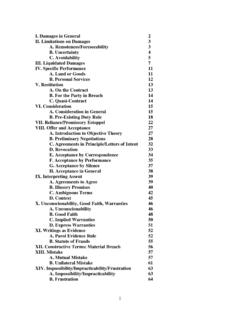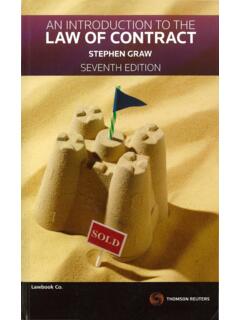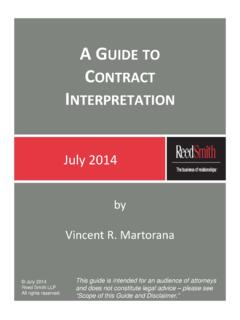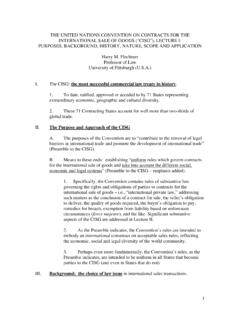Transcription of I. THE FLORIDA SUNSHINE LAW - Miami-Dade County …
1 I. THE FLORIDA SUNSHINE LAW. The main provision of the SUNSHINE Law, Section (1), FLORIDA Statutes (2010), reads as follows: All meetings of any board or commission of any state agency or authority or of any agency or authority of any County , municipal corporation, or political subdivision, except as otherwise provided in the Constitution, at which official acts are to be taken are to be declared to be public meetings open to the public at all times, and no resolution, rule, or formal action shall be considered binding except as taken or made at such meeting. The board or commission must provide reasonable notice of such meeting. The SUNSHINE law equally binds all members of governmental bodies, be they advisory members or elected officials, and the requirements apply to every step in the decision- making process of an agency.
2 The SUNSHINE Law applies to the School Board. For purposes of this memorandum, we are considering only the School Board. This memorandum does not address issues that may arise concerning the application of the SUNSHINE Law to committees appointed by the Superintendent as the chief executive officer of the school system or committees formed solely for fact-finding. A. Substantive Requirements of the law 1. All meetings must be open to the public. 2. Minutes of each meeting must be promptly recorded, and open to public inspection. There is no requirement that tape recordings be made. However, once made, such recordings are public records. (see below, The FLORIDA Public Records Act). 3. Meetings may not be held at any facility or location which discriminates on the basis of gender, race, color, religion, ethnic or national origin, political beliefs, marital status, age, sexual orientation, social and family background, linguistic preference, disability, or economic status or that operates in such a manner as to unreasonably restrict public access to such a facility.
3 4. There are no exemptions or exceptions for organizational meetings, briefing sessions, workshops, informal discussions, or other meetings no matter what they may be called. 5. No two or more members may meet and discuss any matter on which foreseeable action will be taken by the committee without meeting the requirements of the SUNSHINE Law. 6. The SUNSHINE Law applies not just to in-person meetings but to certain electronic communications among members of a committee, including the use of e-mail to discuss committee business. 7. Members are not prohibited under the SUNSHINE Law from meeting together socially, provided that matters which may come before the board or commission are not discussed at such gatherings. 8. the law provides severe sanctions and penalties in the event of violations by a committee, or by individuals.
4 Upon proof, a court can invalidate committee action taken in violation of the SUNSHINE Law, assess attorney's fees against the School Board and against committee members, and impose criminal penalties against committee members. B. Procedural Requirements of the law 1. Reasonable notice of meetings must be given to the public in advance and should include the date, time and place of the meeting, and an agenda or list of subjects to be considered, if available. Generally, reasonable notice . means five (5) working days prior to the date of the meeting. See School Board Rule 6Gx13- , District Advisory Committee Meeting Notices/Announcement and Procedures for Publication, for additional information. 2. The notice should be prominently displayed in the area in the agency's offices set aside for that purpose.
5 The use of press releases and phone calls to the wire services and media is highly effective. On matters of critical public concern, advertising in local newspapers would be appropriate. 3. The following statement should appear on every notice of a meeting: IF A PERSON WISHES TO APPEAL ANY DECISION. MADE WITH RESPECT TO ANY MATTER CONSIDERED. AT THIS MEETING OR (HEARING), SUCH A PERSON. SHOULD ENSURE THE PREPARATION OF A VERBATIM. RECORD OF THE PROCEEDINGS INCLUDING THE. TESTIMONY AND EVIDENCE UPON WHICH THE APPEAL. IS TO BE BASED.. 4. Votes must be recorded or counted for each member present at a meeting. This does not require a roll call vote on every subject, and voting by ayes and nays is permissible. Voting by written ballot is also permitted as long as the votes are made openly at a public meeting and the ballots are maintained and made available for public inspection.
6 Secret ballots are not permitted. II. THE FLORIDA PUBLIC RECORDS ACT. Section (1), FLORIDA Statutes (2010), defines public records to include: all documents, papers, letters, maps, books, tapes, photographs, films, sound recordings, data processing software, or other material, regardless of the physical form, characteristics, or means of transmission, made or received pursuant to law or ordinance or in connection with the transaction of official business by any agency. Unless a statutory exemption applies, any and all records made or received, . and used to perpetuate, communicate or formalize knowledge, in connection with the business of the School Board are subject to inspection by any person upon request and upon reasonable notice.
7 Notes and nonfinal drafts of committee business, if circulated for review, comment or information, are public records. The motive of the person requesting access to records is irrelevant, and no reason need be given. The possibility that disclosure of records may cause embarrassment or annoyance is not a ground for refusing access. The Board Attorney's Office will assist if specific questions arise. Copies of records must be furnished if requested. The request for a public record need not be in writing. Charges for photocopies shall be collected pursuant to School Board Rule 6Gx13- , Public Access to School District Records; Section (1)(a), FLORIDA Statutes (2009). III. THE CODE OF ETHICS OF PUBLIC OFFICERS AND EMPLOYEES. The Code of Ethics is embodied in Part III of the Chapter 112, FLORIDA Statutes.
8 It specifically covers the School Board and its advisory bodies which are defined as any board, commission, committee, council, or authority, however selected, whose total budget, appropriations, or authorized expenditures constitute less than 1 percent of the budget of each agency it serves or $100,000, whichever is less, and whose powers, jurisdiction, and authority are solely advisory and do not include the final determination or adjudication of any personal or property rights, duties, or obligations, other than those relating to its internal operations. Section (1), FLORIDA Statutes (2010). A. Board members are required to file financial disclosure and gift statements. Fla. Stat. (2), and B. The following provisions of the Code are binding on School Board members: 1.
9 Members are prohibited from soliciting or accepting anything of value, such as a gift, loan, reward, promise of future employment, favor or service that is based on an understanding that their vote, official action, or judgment would be influenced by such gift. Section (2), FLORIDA Statutes (2010). 2. Members are prohibited from accepting compensation, knowing or having reason to know that it was given to influence a vote or action. 3. Members are prohibited from using their official position to secure a special privilege, benefit, or exemption for oneself or others. 4. Members are prohibited from using information gained that is not available to the general public for personal gain or benefit of another. C. Several other restrictions apply to School Board members, but are subject to exemptions or waiver as explained below: 1.
10 The sale, rent, or lease by a member, of any realty, goods or services to the School Board are prohibited. Contracts existing at the time of appointment are not affected. 2. The purchase, rent or lease by a member for the School Board of any realty, goods, or services from a business of which the member is an officer, partner, director, or proprietor, or in which the member or the member's spouse or child owns a material interest, are prohibited. Again, contracts existing at the time of appointment are not affected. 3. A member is prohibited from holding any employment or contractual relationship with any business entity or agency which is doing business with the School Board. 4. A member is prohibited from holding any employment or contractual relationship that will create a continuing or frequently recurring conflict between his private interests and the performance of his public duties or that would impede the full and faithful discharge of his public duties.





